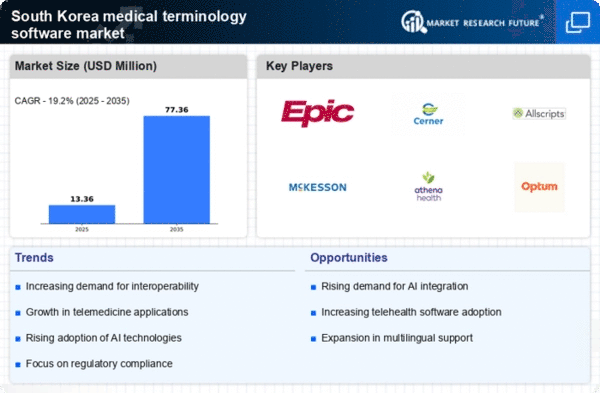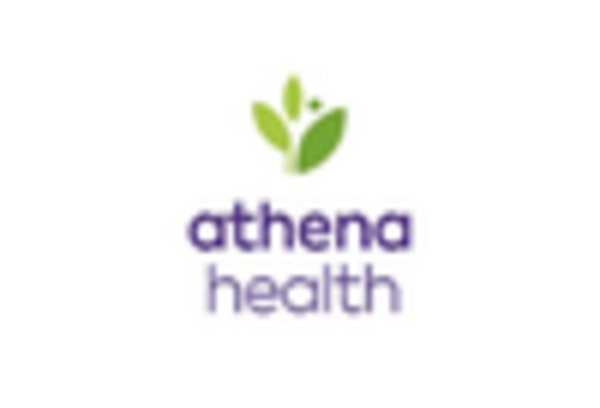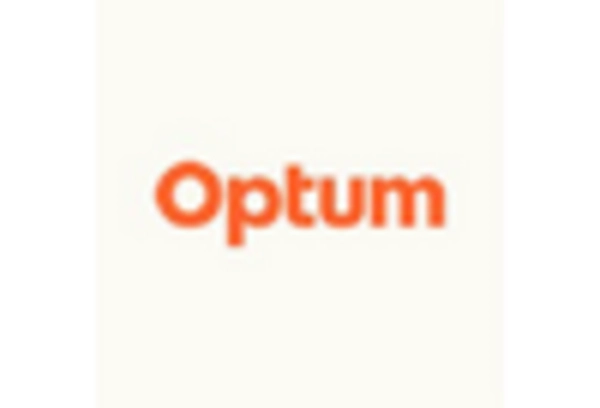Expansion of Telehealth Services
The expansion of telehealth services in South Korea is significantly impacting the medical terminology-software market. As telehealth becomes more prevalent, the need for effective communication and accurate medical documentation is paramount. Medical terminology software plays a crucial role in ensuring that healthcare providers can efficiently document patient interactions and maintain accurate records in a virtual environment. The South Korean government has been actively supporting telehealth initiatives, which is likely to drive further adoption of medical terminology solutions. This trend suggests that the medical terminology-software market will continue to grow as healthcare organizations seek to enhance their telehealth capabilities and ensure compliance with documentation standards.
Rising Demand for Healthcare Efficiency
The medical terminology-software market in South Korea is experiencing a notable surge in demand driven by the need for enhanced healthcare efficiency. As healthcare providers strive to streamline operations, the adoption of software solutions that facilitate accurate medical coding and terminology management becomes increasingly critical. Reports indicate that the healthcare sector in South Korea is projected to grow at a CAGR of approximately 7.5% over the next five years, which suggests a corresponding rise in the utilization of medical terminology software. This trend is likely to be fueled by the increasing complexity of healthcare data and the necessity for precise communication among healthcare professionals. Consequently, the medical terminology-software market is positioned to benefit from this growing emphasis on operational efficiency and accuracy in patient care.
Technological Advancements in Health IT
Technological advancements are playing a pivotal role in shaping the medical terminology-software market in South Korea. The integration of advanced technologies such as machine learning and natural language processing is enhancing the capabilities of medical terminology software. These innovations enable more efficient coding processes and improve the accuracy of medical documentation. As healthcare providers increasingly adopt electronic health records and other digital solutions, the demand for sophisticated terminology software is expected to rise. The South Korean government has also been promoting the digital transformation of healthcare, which further supports the growth of the medical terminology-software market. This technological evolution is likely to lead to more streamlined workflows and improved patient care outcomes.
Growing Emphasis on Patient-Centric Care
The medical terminology software market in South Korea is witnessing growth due to the increasing focus on patient-centric care. Healthcare providers are recognizing the importance of effective communication and accurate documentation in enhancing patient outcomes. Software solutions that facilitate the use of standardized medical terminology are essential for ensuring that patient information is accurately captured and shared among healthcare teams. This trend aligns with the broader movement towards personalized medicine, where tailored treatment plans are developed based on precise patient data. As a result, the medical terminology-software market is likely to see increased investment from healthcare organizations aiming to improve patient engagement and satisfaction through better data management and communication.
Increased Regulatory Compliance Requirements
In South Korea, the medical terminology-software market is significantly influenced by the evolving landscape of regulatory compliance. Healthcare organizations are mandated to adhere to stringent regulations regarding data management and patient information security. The implementation of software solutions that ensure compliance with these regulations is becoming essential. For instance, the Ministry of Health and Welfare has introduced new guidelines that necessitate the use of standardized medical terminologies in electronic health records. This regulatory push is likely to drive the adoption of medical terminology software, as organizations seek to avoid penalties and enhance their operational integrity. The market is expected to expand as healthcare providers invest in solutions that not only meet compliance standards but also improve overall data accuracy and interoperability.
















